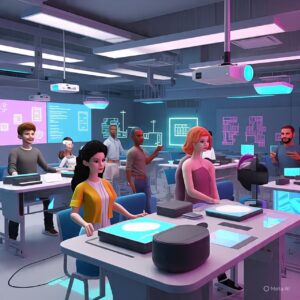The metaverse has quickly emerged as one of the most exciting and innovative technological concepts. Combining virtual reality (VR), augmented reality (AR), and digital environments, the metaverse is changing how we interact, work, and learn. As educational institutions and businesses explore new ways to engage students and enhance growth, the potential of the metaverse in education is undeniable.
In this blog, we’ll explore how the metaverse can transform education, unlock new growth opportunities, and revolutionize learning experiences for both students and educators.
What is the Metaverse?
Before diving into its role in education, let’s clarify what the metaverse is. The metaverse is a digital universe that integrates virtual spaces with the real world. It allows users to interact with digital environments and each other using avatars. The metaverse includes various elements such as virtual reality, augmented reality, and digital currencies, creating a unique immersive experience.
As the metaverse evolves, it has the potential to redefine industries, especially in sectors like education, healthcare, and entertainment.
How the Metaverse is Transforming Education
The metaverse is set to change the way we approach education by offering new ways for students and teachers to interact in virtual learning environments. Here’s how the metaverse is revolutionizing education:
1. Immersive Learning Experiences
Instead of relying solely on textbooks or video lectures, students can now explore 3D models of the human body, walk through historical events, or visit planets in the solar system. Immersive learning using VR and AR within the metaverse allows students to engage with content in a more interactive and meaningful way.
-
For example, medical students can perform virtual surgeries, and history students can experience historical events firsthand.
2. Personalized Learning
The metaverse provides opportunities for personalized learning. Virtual environments can be tailored to individual learning styles, enabling students to progress at their own pace. Students can revisit lessons, practice concepts, and engage in hands-on activities that suit their unique learning preferences.
-
Gamified learning can further enhance engagement, making education fun while promoting knowledge retention.
3. Access to Global Learning Communities
One of the greatest benefits of the metaverse is that it removes geographical barriers. Students from around the world can join virtual classrooms, collaborate with peers, and connect with educators in real-time. Global learning communities enable diverse perspectives and enrich the educational experience.
-
Imagine a student in New York collaborating with a peer from Japan on a science project, all within a virtual classroom.
4. Simulations for Skill Development
Another significant advantage is the ability to provide realistic simulations for skill development. Whether it’s practicing public speaking, building complex engineering projects, or learning new languages, students can engage in virtual activities that closely replicate real-world experiences.
-
This immersive approach boosts confidence and helps students acquire skills in a risk-free environment.
The Role of the Metaverse in Professional Growth
The metaverse isn’t just transforming education—it also holds tremendous potential for professional development and growth. Here’s how:
1. Virtual Workplaces and Training
Companies can leverage metaverse technologies to create virtual workplaces for training employees. Virtual environments can simulate real-world scenarios, offering employees hands-on experience without any physical limitations.
-
Training programs in sectors like customer service, hospitality, and healthcare can use the metaverse to provide realistic simulations for employees.
2. Networking and Career Advancement
The metaverse can facilitate professional networking, offering virtual conferences, events, and job fairs where individuals can connect, collaborate, and grow their careers.
-
Attending virtual networking events is an excellent way for professionals to meet people globally, explore opportunities, and gain exposure to new ideas.
3. Skill-building through Online Courses
Through the metaverse, professionals can enroll in virtual courses that incorporate interactive learning techniques. This form of continuous learning provides workers with opportunities to develop new skills, stay updated on industry trends, and advance their careers.
-
The integration of interactive VR workshops and AR-based tutorials can create engaging environments for professional development.
The Future of the Metaverse in Education and Growth
While the metaverse is still in its early stages, its future in education and professional growth looks promising. Here are some trends and predictions for what we can expect in the coming years:
-
Integration with AI and Data: As artificial intelligence (AI) becomes more sophisticated, the metaverse will offer even more tailored learning experiences by analyzing students’ behaviors, preferences, and needs.
-
Broader Adoption in Schools: With increasing awareness, more schools and universities are likely to adopt metaverse technologies to enrich their curricula, increase engagement, and enhance overall learning outcomes.
-
Enhanced Collaboration: The future metaverse will allow even deeper collaboration between educational institutions, researchers, and industries. Virtual labs, virtual internships, and professional workshops will continue to grow in popularity.
Challenges and Considerations
Despite its immense potential, the metaverse faces several challenges that need to be addressed:
-
Digital Divide: Not all students have access to the necessary technology and the internet. Ensuring equal access to the metaverse is crucial for its widespread adoption.
-
Privacy Concerns: As the metaverse collects vast amounts of personal data, it’s important to ensure the privacy and security of users, especially students.
-
Adaptation by Educators: Teachers and institutions must adapt to new technologies and tools. Training educators to effectively utilize the metaverse will be key to maximizing its benefits.
Conclusion: Embracing the Metaverse for Education and Growth
The metaverse has the potential to transform education and professional growth in ways we have yet to fully explore. By offering immersive learning experiences, personalized education, and global connectivity, it can change how we teach, learn, and grow professionally.
As the technology evolves, we can expect an even greater role for the metaverse in education, making learning more interactive, engaging, and accessible to all.
Call-to-Action:
Are you an educator, student, or professional looking to take advantage of the metaverse? Start exploring virtual classrooms, online courses, and networking events in the metaverse today. The future of education and growth is waiting for you in the digital universe.


